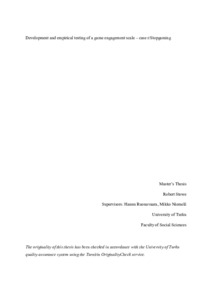Development and empirical testing of a game engagement scale : case r/Stopgaming
Stowe, Robert (2020-04-14)
Development and empirical testing of a game engagement scale : case r/Stopgaming
Stowe, Robert
(14.04.2020)
Julkaisu on tekijänoikeussäännösten alainen. Teosta voi lukea ja tulostaa henkilökohtaista käyttöä varten. Käyttö kaupallisiin tarkoituksiin on kielletty.
avoin
Julkaisun pysyvä osoite on:
https://urn.fi/URN:NBN:fi-fe2020050725607
https://urn.fi/URN:NBN:fi-fe2020050725607
Tiivistelmä
The thesis conceptualises gaming from leisurely and labour-like starting points and both measures and develops this perspective by pioneering a concept of game engagement. Putting forth this perspective is grounded by appeals to burnout in and out of professional contexts in the videogame industry, ludology and research on player experiences. These views coming together prompted a need to verify whether games are to be normatively held as engaging in only popular belief, or verifiably so in actuality. In so doing, both methodological and theoretical insight is provided. The engagement construct was adapted from the Utrecht Work Engagement Scale -9 (short form) and a survey study was conducted. Data was analysed using ordinal logistic regression and exploratory factor analysis.
Results showed those not holding games dear to them may require substantial investment increases to reap adequate increases in engagement, if playtime is low, while a committed orientation towards gaming (in terms of subjective gamerhood and hours played) showed marked differences in engagement per incremental increase in playtime. These results are considered descriptive, rather than predictive. Future directions for game studies are suggested to uncover how players become disengaged and how rationalisation affects the gaming experience.
Results showed those not holding games dear to them may require substantial investment increases to reap adequate increases in engagement, if playtime is low, while a committed orientation towards gaming (in terms of subjective gamerhood and hours played) showed marked differences in engagement per incremental increase in playtime. These results are considered descriptive, rather than predictive. Future directions for game studies are suggested to uncover how players become disengaged and how rationalisation affects the gaming experience.
